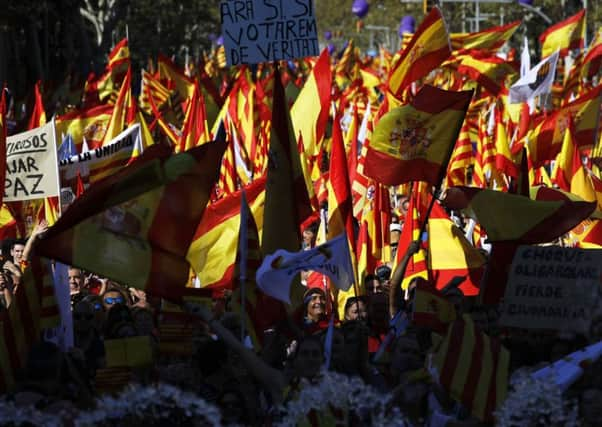Stewart Arnold: Catalonia shows way ahead for Yorkshire


Since October, there have been a number of arrests of leading political figures and there was a particularly poignant and emotional moment at Esquerra’s eve of poll rally when the party’s leader gave a speech in a recorded message to the crowd from his prison cell in Madrid.
That Esquerra was able to overcome their leaders’ imprisonment (and a further two senior figures were in exile in Brussels) was considerable. In fact, Esquerra got its highest number of seats ever.
Advertisement
Hide AdAdvertisement
Hide AdOverall though, the election changed little – the secessionist parties retain their majority of seats in the Catalan Parliament. What was truly remarkable nonetheless was the turnout. Bearing in mind that Catalans have been to the polls at least once a year over the past four years, there was no sign of voter fatigue as no less than 85 per cent of the population cast their ballot.
The turnout shows how the Catalan population – whether they be supporters of either independent or unionist parties – is engaged with the issues. This contrasts with the debate in Yorkshire or, more precisely, the lack of debate when it comes to our devolution.
Whilst I was in Barcelona the results of two local ballots (in Doncaster and Barnsley) on devolution were announced. There was an overwhelming majority in both communities for a One Yorkshire deal rather than Sheffield City Region option. This was on a very creditable 22 per cent turnout. Yes, low in comparison to Catalonia, but for a local council ballot in December quite respectable.
Nevertheless, this public engagement needs to be much wider. That is why I have written to all the council leaders in Yorkshire urging them to do the same as Barnsley and Doncaster in their own communities.
Advertisement
Hide AdAdvertisement
Hide AdBallots of this kind would do two things. Firstly, they would engage the Yorkshire people in what has hitherto been discussions behind closed doors between council leaders and government ministers. Secondly, it will give all those local authorities supporting the One Yorkshire deal ammunition when it comes to negotiations with the Northern Powerhouse Minister. Imagine the authority that would come from knowing that eight out of 10 people in the county were behind the One Yorkshire deal.
Part of the problem with the devolution debate in Yorkshire to date is that it has become almost entirely focussed around the issue of money. Specifically, what sort of grant will the UK government give local authorities and over what timescale.
However, the debate should be broadened beyond this. For one thing what is on offer from the Government is not regional devolution – it is little more than local economic management. We should be taking this opportunity – collectively – to set out what we want the future to look like across a whole range of issues. Above all else, we should be seeing this as an opportunity to renew our democracy. The greater citizen participation in Catalonia did not come by accident. It was as a result of the part played by citizens’ assemblies which were not partisan throughout the region. People were drawn into the process, either in person or via social media, in local communities or through trade unions, universities, schools and so on.
Surely such a possibility exists in Yorkshire. Even allowing for the constraints, the ballots in Barnsley and Doncaster showed that we are some way away from engaging the population as a whole in the devolution debate. This has to change if we are to inspire people that this process is something to get excited about. Potentially, it could have significant impact on people’s lives and they should be involved in framing the way forward. That is why 2018 should see the creation of a Yorkshire People’s Assembly. A bottom-up approach of this kind offers us a chance to renew our somewhat tired, tribal politics in Yorkshire.
Advertisement
Hide AdAdvertisement
Hide AdWe might be some way off from the sorts of turnouts Catalonia has at its elections, but nevertheless this year might just be the start of a restoration of democratic engagement between politicians and citizens in Yorkshire.
Stewart Arnold is the leader of the Yorkshire Party